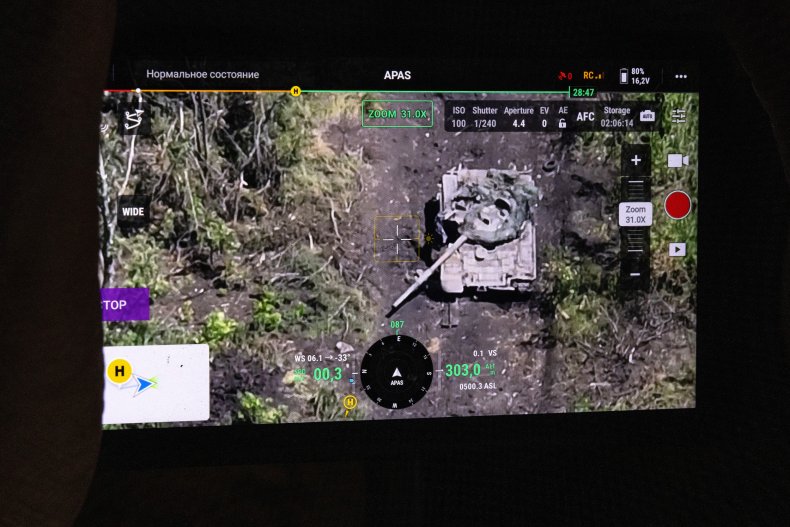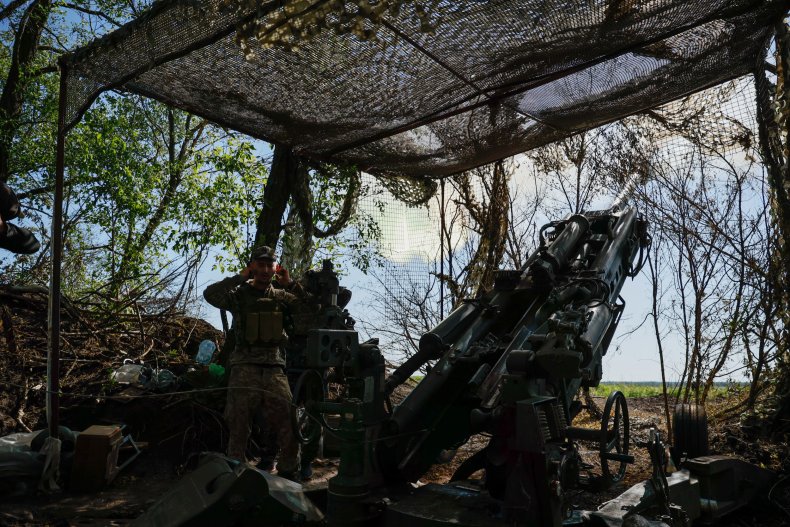DAVID BRENNAN

Beleaguered Russian soldiers in Ukraine are so far countering "pretty much everything" Kyiv's attacking troops have to offer, according to an American special operations veteran who since 2022 has been training Ukrainian units to root out Moscow's invasion forces.
Erik Kramer, the director and co-founder of the Kyiv-based Ukraine Defense Support Group, spoke to Newsweek from the Ukrainian capital, where he and his team of ex-military volunteers are now preparing to instruct a new batch of Ukrainian troops destined for the front.
Ukrainian forces are now on the offensive at multiple points along the 800-mile front, probing for weaknesses in the Russian lines they hope might be the key to another major defeat for Moscow. But Kramer—who served for 26 years in locations including Afghanistan, Bosnia, Congo, Iraq, and Kosovo—said Kyiv's troops face a daunting task.
"I was saying since day one last fall when they were talking about the big counteroffensive in the spring, that the gains will be limited at best," Kramer said. "It's unfortunately played out just like I thought it would."
A monitor from a drone shows a destroyed Russian tank during a surveillance flight on July 16, 2023 near Bakhmut in the Donetsk region of Ukraine. Ukrainian forces have gone on the counterattack, but Russian defenders are proving dogged.PAULA BRONSTEIN/GETTY IMAGES
"Right now, it looks like the counteroffensive is piecemeal," he added. "It looks like they're probing to see where there's weakness in the lines. And what I think the plan is that, once they find some holes, they'll try to exploit them."
Such an approach is likely to deliver "a couple of breakthroughs," Kramer said, but not necessarily the kind of large-scale defeat of Russian forces as occurred north of Kyiv, in Kharkiv, and in Kherson in 2022.
"The Ukrainians are doing just a little bit better with it with the way they do things," Kramer—who along with his UDSG group of 10 to 15 volunteer trainers has instructed thousands of Ukrainian personnel from almost every part of the country's armed forces—added. "But again, the Russians are learning too."
"You can just take a look at some of the videos on Telegram, where you'll see a Ukrainian infantry squad or platoon attacking a trench line," Kramer explained. "They'll get into the trench line, and then all of a sudden artillery will come down. Boobytraps, hand grenades; sometimes the trench they're attacking is abandoned and it's a setup."
"The same thing with anything with urban. The Ukrainians are going into these buildings, and the Russians are just pummeling the building. They don't care if it stands, it's not like they're trying to defend the buildings. So, going room to room, the way they were taught, is just not effective today, it's not feasible."
President Volodymyr Zelensky is among the Ukrainian figures to have admitted that the counteroffensive is progressing "slower than desired," though he and others have urged patience.
Since the operation began in early June, Kyiv has claimed to have freed eight settlements and more than 80 square miles of territory. The Russian defenders have proved dogged, even amid reports of severe supply constraints due to Ukrainian deep strikes, and persistent morale and corruption issues within the military structure.
"The Russians have still been able to set up defensive lines and counter pretty much everything the Ukrainians have thrown at them," Kramer said. "I don't see the imminent collapse of the Russian army. I can see some pockets collapsing if there is a major breakthrough. But I'd say overall, the Russian military will still be an entity, a coherent entity, even if the Ukrainians have success."
The Russian military is a "behemoth," the special forces veteran added. "To take down the whole Russian military, which is probably a million men...would be huge. You'd have to have leadership at almost every level collapse or turn."
"I just don't see the Russian military collapsing. It's too big, it's too unwieldy. It's got too many layers."
Quality vs. Quantity
Russia's full-scale invasion has been punctuated with battlefield surprises. Ukraine's heroic spring 2022 defense surprised many foreign observers, as did Moscow's inability to prosecute a modern war.
Likewise, Kyiv's lightening offensive in Kharkiv in fall 2022 confounded those who were waiting for the hammer to fall on Kherson. More recently, Wagner Group financier Yevgeny Prigozhin's short-lived coup was an unexpected destabilizing factor for the Kremlin.
"The thing about wars, and the fog of war, is that you never know what can happen," Kramer said.
Newsweek has contacted the Russian Defense Ministry by email to request comment.
Some notable concrete lessons are emerging from the full-scale war, now nearing the 18-month mark with no end in sight. NATO nations—and in particular European states—have proven ill-prepared for the return of major mechanized conflict to the continent. Cutting-edge NATO technology is helping Ukraine, but the traditional use of low-tech massed artillery still dominates the battlefield.
 A gun crew of an M777 howitzer fires onto Russian positions near the occupied Ukrainian city of Bakhmut on July 13, 2023 in Donetsk Oblast, Ukraine. Artillery has shaped the course of Moscow's full-scale invasion.ROMAN CHOP/GLOBAL IMAGES UKRAINE VIA GETTY IMAGES
A gun crew of an M777 howitzer fires onto Russian positions near the occupied Ukrainian city of Bakhmut on July 13, 2023 in Donetsk Oblast, Ukraine. Artillery has shaped the course of Moscow's full-scale invasion.ROMAN CHOP/GLOBAL IMAGES UKRAINE VIA GETTY IMAGES"NATO, and especially the American military, always thinks this technology is the way to overcome mass," Kramer said. "But it's just proven time and time again, especially in this war, that that's just not the case. Throw enough bodies at something, eventually it's going to break. Numbers do matter. Technology versus mass is a more complicated relationship than it looks in outward appearances."
"The interesting thing about this war is that the massing of troops and massing fires, all this stuff that the West said was passé, is not passé. It still very much plays a prominent role. And even if Ukraine has the best trained military, the Russians still got the numbers on them."
"Quantity does matter, whether soldiers on the battlefield or artillery. These low-tech pieces of combat power that we thought were going to be diminished? No, they're just as important today as they were in World War One."
No comments:
Post a Comment